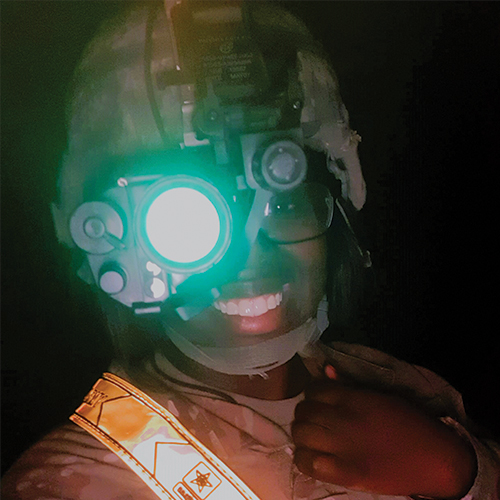Army Veteran Finds Hope in Operation Homefront Transitional Housing Apartment

Until recently, Army veteran Ariel Thomas had only questions as she transitioned to civilian life after a decade of military service.
Where would she live? Would she be reunited with her 9-year-old son, who was living with his father five hours away? Would she be able to continue pursuing a college degree?
Answers to Ariel’s questions became clear, and her outlook brightened when she was accepted into Operation Homefront’s Transitional Housing (Apartments) program in Urbana, Maryland.
Ariel and her son, Xzavier, moved into the two-bedroom apartment in May, and she is on track to graduate with a bachelor’s degree in forensic studies from Loyola University Maryland. From there, the single mom said, her goal is to attend Johns Hopkins University medical school and become a forensic pathologist.
The Transitional Housing (Apartments) program, launched in 2021, is the newest of Operation Homefront’s four distinct programs to assist military families transitioning to civilian life.
Operation Homefront provides apartments to honorably discharged veterans within four years of service. During the yearlong program, veteran families pay no rent or utilities, and they participate in financial counseling and career education to help achieve stability and chart a path to long-term post military success.
“Before Operation Homefront, I was stressing about home, money, food – all the things you need,” Ariel said. “They took away that stress for me and allowed me to be able to take care of myself. Now I see that I can do this and it’s not the end of the world that everything is changing (since separating from the military).”
A year after graduating from high school, Ariel continued her family’s tradition of military service. Her parents were both career Marines, with her mother serving 20 years and her father 22 years. Like them, Ariel worked in communications during her 10 years in the service.

Much of her time was spent on training missions with troops, and that took her away from her son and exacted a physical toll on her body.
“Everywhere the Army goes, they need communications,” she said. “We were always in the field working with U.S. and international troops.”
Communications squadrons move heavy equipment such as generators and satellites. Ariel lives with degenerative disk disease and foot conditions that impaired her mobility.
“My job was outside, and I was always moving around,” she said. “I was limping to the point that it was hard to walk, and I was almost falling over.”
Doctors couldn’t assure Ariel that surgery would correct her feet, and she was medically retired in October 2021.
Ariel immediately plunged into college classes to earn a degree in forensic studies. Xzavier lived with his father in North Carolina while she pursued housing options and waited for her disability rating.
At first, she lived in a hotel but knew her budget couldn’t sustain that. She reached out to Operation Homefront’s Transitional Housing (Villages) – a sister program to the Transitional Housing (Apartments) – but learned there was no apartment available in the Maryland Village.
However, a few months later, Ariel got a surprise call from Maryland Village manager Mary Mahoney who suggested she apply for an apartment coming available in Urbana.
“This changed my life.”
Ariel Thomas, Army veteran
“I think my heart burst” when I was approved, Ariel said. “I had no clue what I was going to do after the dorm, but the apartment was ready right when I had to move out. And now I have a home, and my son is with me.”
Ariel is grateful for the opportunity and for ongoing support from Operation Homefront.
“I don’t think the donors realize how much they help people,” she said. “This has changed my life.”

